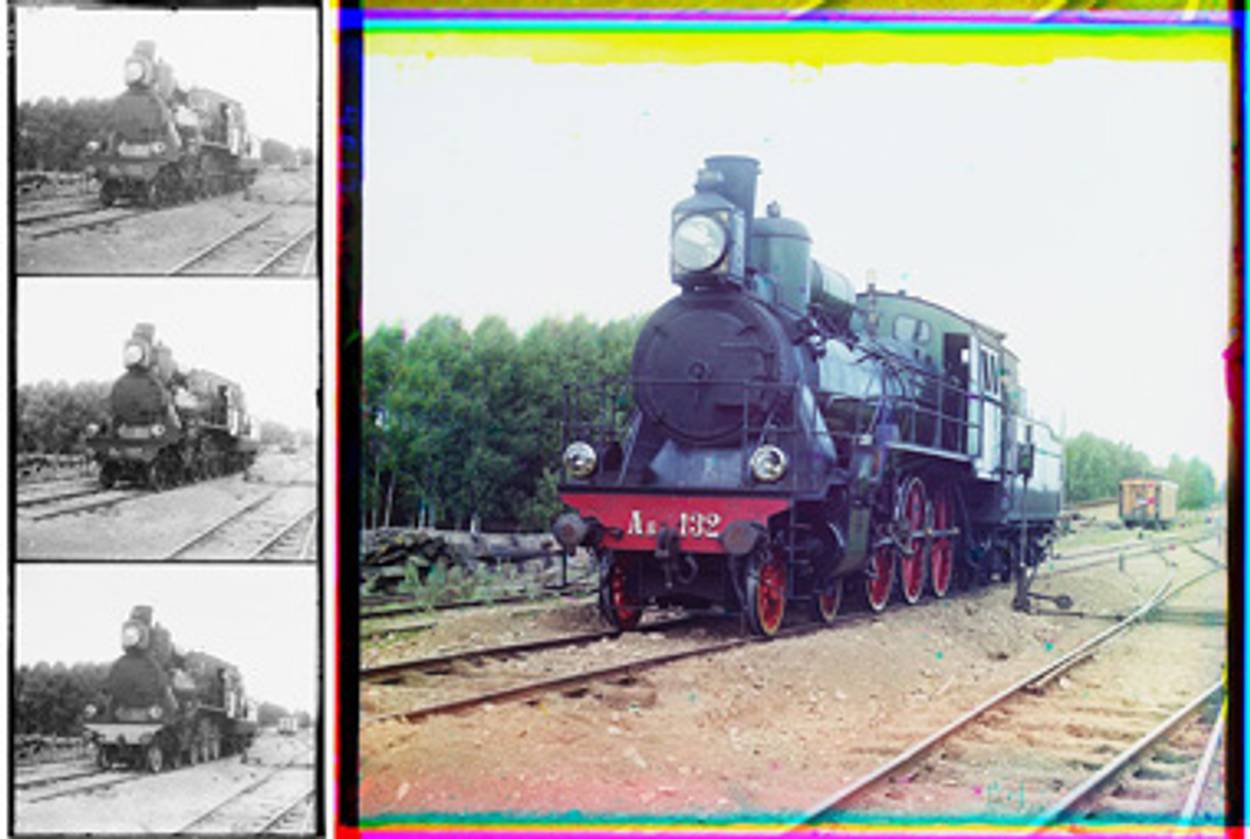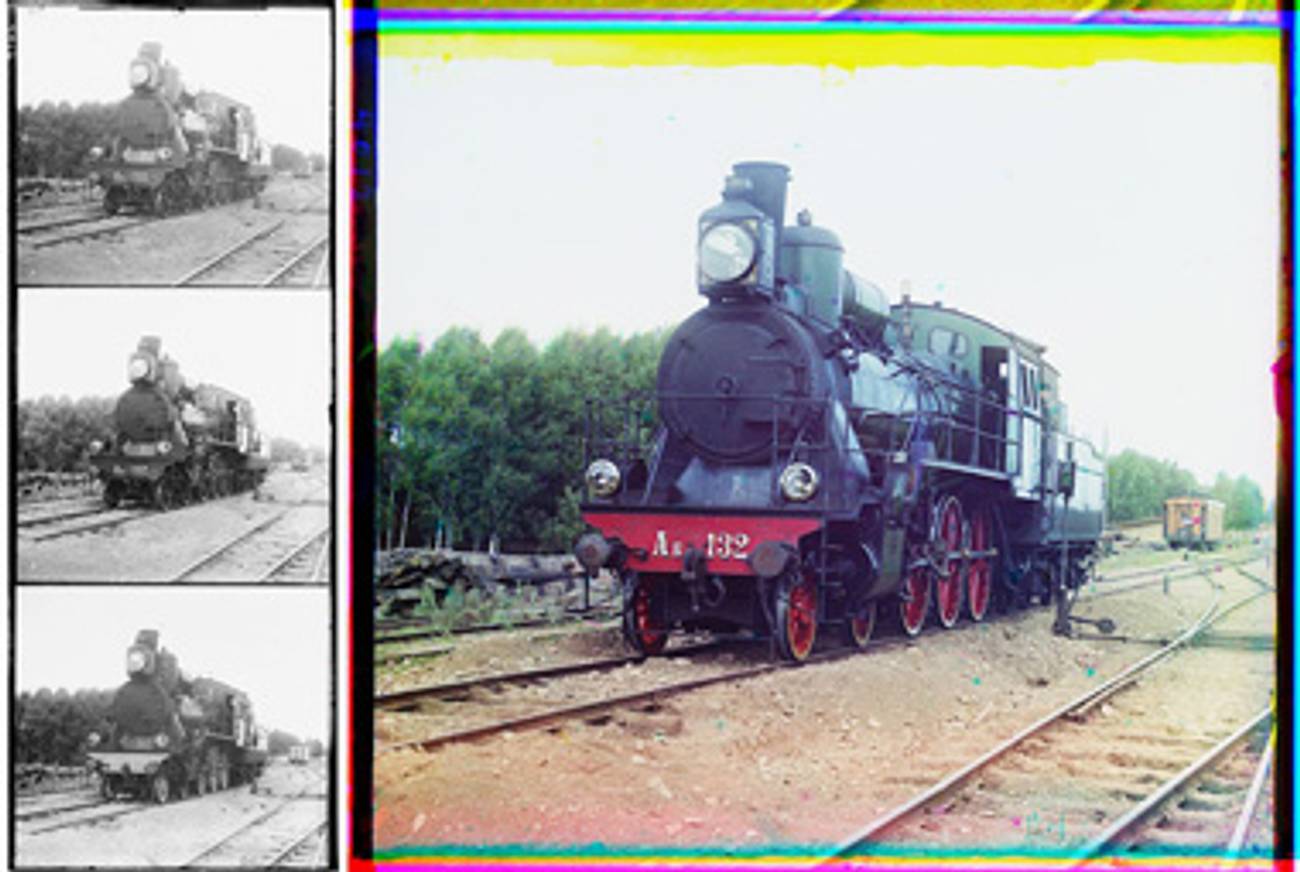Moving Pictures
A new translation of Pasternak’s Doctor Zhivago unlocks the novel’s cinematic qualities




It can seem as if more than half of Boris Pasternak’s masterpiece Doctor Zhivago is only descriptions of nature glimpsed from the window of a moving train:
The long roofs of the platform, stretching into the distance, removed to the last degree the spectacle of the snow falling on the tracks. At such a distance, it seemed that the snowflakes hung in the air almost without moving, slowly sinking into it the way bread crumbs fed to fish sink into the water.
Beyond the opening of the window, by which they lay with their heads thrust forward, spread a flooded area with no beginning or end. Somewhere a river had overflowed, and the waters of its side branch had come up close to the railway embankment. In foreshortening, brought about by looking from the height of the berth, it seemed as if the smoothly rolling train was gliding right over the water.
The fleetness of such observations calls to mind film, especially early silent “motion pictures,” and their antecedents in zoetropes and the Lanterna Magica—any of those old devices that arrested a train’s progress and instead spun shots past a static eye. Each of Pasternak’s train windows is a frame; each sets a small scene. Taken together these scenes form a whole that seems alternately to be a film script and a film itself: Some scenes are fleshed only briefly, while others receive the full treatment with makeup and wardrobe.
Whichever it better resembles however, this new Zhivago—the first translation of the novel in 50 years—is far more psychologically subtle than that kitschy Hollywood vehicle for the emoting of Omar Sharif and Julie Christie. This post-Soviet Zhivago is the work of that tireless translating couple Richard Pevear and Larissa Volokhonsky. In the last two decades they’ve rendered into English all the major novels of Dostoyevsky, Bulgakov’s The Master and Margarita, Gogol’s Dead Souls and Complete Stories, a few dozen stories by Chekhov, in addition to Tolstoy’s Anna Karenina, War and Peace, and The Death of Ivan Ilyich. One pities poor Turgenev—poor genius Turgenev—who awaits his reincarnation at another’s hands.
***
Pasternak himself, born in 1890, lived a tragically cinematic life; in a biopic a younger Martin Landau would have played him with wonderful pathos. Pasternak’s father, Leonid, was a portraitist of Tolstoy and the first Russian painter to engage Impressionism, while his mother, Rosa, was an acclaimed pianist. Pasternak took after her, studying composition with Alexander Scriabin, whose synesthesic theories (colors have sounds) influenced his pupil’s later poetics. Lacking Absolute Pitch but not absolved of ambition Pasternak abandoned music for philosophy, studying briefly in Marburg with Hermann Cohen, founder of Neo-Kantianism—which school marked philosophy’s re-rationalizing, or return to logic after a half-century of metaphysics and materialism—and the foremost Jewish thinker of his age. Another mentor was Russophile Rainer Maria Rilke, with whom Pasternak corresponded. Poetry came easily but prose did not, and Zhivago took nearly a decade a write. Obviously impossible to publish in the Soviet Union, it was smuggled to Milan, where it was issued by the communist but influential Feltrinelli Editore in 1957.
Max Hayward and Manya Harari’s English translation appeared the same year, rife with elisions and lacunae. Besides being more complete than that 1957 version, the Pevear-Volokhonsky Zhivago is linguistically more wild, often complex, sometimes complicated, self-consciously moderne—annexing the epigrammatic wit of Blok and Mayakovsky to the vast prosaic stretches of the 19th-century Russian novel. What in the previous translation was clear and focused has, with a turn of the lens, come into a warm blurriness, a gauze. It is as if Cold War America required clarity—moral transparency requiring transparent prose—but after the fall of Sovietism our verbiage can be just as muddled as our politics. Each is obviously the appropriate Zhivago for its time.
In Hayward-Harari the passage I quoted at the beginning of this review—narrating the Zhivago family’s journey east into Siberia, fleeing the 1917 Revolution—has been smoothed into a placid, pristinated English, as if Pasternak’s original has been covered with a layer of cleansing, conciliatory snow:
The falling snow could be seen only beyond the far end of the roofs; seen so far away, it looked almost still, sinking to the ground as slowly as bread crumbs thrown to fishes sink through water.
The second passage is even more starkly abridged:
Through the opening in the window they could see the country covered with spring floods as far as the eye could reach. Somewhere a river had overflowed its banks and the water had come right up to the embankment. In the foreshortened view from the bunk it looked as if the train were actually gliding on the water.
When comparing two translations without the ability to read the source, that source can serve only as an ideal in the critic’s mind—and this ideal is a fertile metaphor for Russia. That country that once sprawled over 11 time zones might not exist except in the various traductions of its interpreters. Zhivago, written as a solace throughout World War II, both embodied and contradicted the two dominant schools following World War I: Tsarist and Communist, the Whites and the Reds. While Revolution foments, Yuri Zhivago, apolitical son of the bourgeoisie, an erstwhile physician and poet, flees Moscow—factual Moscow—for Varykino, a fictional town in the folkloric Urals (one can’t help but note the word kino—“film”—buried at the end of that name). From idyllic privation he’s abducted by Bolshevik partisans to serve as their medic, loses his family to emigration, begins another family with his fated love Larissa Feodorovna, loses her, keeps house with a third woman, writes poetry, dies.
Certainly if this book is read as one gazes passively through a train window this can all founder on melodrama, Slavic soul rendered in Technicolor—huge pans across landscapes, ridiculously contrived coincidences (people who appear later always turn out to have been met earlier on trains; wives and children show up when characters both least and most expect it; people presumed dead have merely changed names and gone underground)—but the active gaze discerns a radical artwork held together through motion alone, sheer velocity. There is nothing sophisticated in Zhivago; not the philosophy—which loves nature as only a Russian loves nature, and loves Jesus as only a Russian Jew loves Jesus (Zhivago is not Jewish, though Pasternak was)—and not even the examples of Zhivago’s poetry, which are elegiac in translation but nothing more. Rather the simplicity of Zhivago suggests just how closely related popular cinema is to the folktale: Both are committed to pure narration; neither feels compelled to reason or explain. A partisan leader who falls from favor shoots himself in the head, and the clumps of blood and exploded brain he leaves in the snow are described as appearing like frozen rowan berries. Pasternak zooms in tightly, holds the shot long. If the folktale is oral lore, the cinema is visual lore—the former is the prehistory of art, while the latter is our living tradition.
***
In 1958, following the novel’s success abroad and Khrushchev’s condemnation, Pasternak was awarded the Nobel Prize for Literature, an honor he initially accepted—“Immensely thankful, touched, proud, astonished, abashed,” read his first telegram to the Swedish Academy—but four days later was persuaded, or forced, to refuse: “Considering the meaning this award has been given in the society to which I belong, I must refuse it. Please do not take offense at my voluntary rejection.”
Three years ago a literary critic named Ivan Tolstoi published a book in Russian—The Laundered Novel, not yet translated into English—alleging that Pasternak’s Nobel win was a CIA complot. Apparently Langley headquarters was aware that Nobel bylaws require all books under consideration to have been published in the language in which they were written (the reason for this rule being to ensure that the awarded words are the author’s, not a translator’s). Tolstoi maintains that the CIA intercepted the airplane delivering the manuscript to Italy, forcing it to land in Malta. With passengers waiting on the tarmac, agents photographed the manuscript page by page, then had the novel published in Russian in America and Europe in a limited edition, of which a few copies were presented directly to the Swedish Academy. No other explanation is so convincing as to how Russian Zhivagi surfaced on two continents almost simultaneously, and how a handful found refuge in Sweden with such expedition.
Tolstoi’s investigation makes for fine suspense, and no doubt Pasternak could have engineered a fitting language for it—a style capable of turning an absurd situation into a narrative both representative and timeless; an Eastern Bloc farce into an elemental epic. After all, that was his greatest talent, to neutralize the violent banality of his era by reminding it of eternity—in his characters’ conversational asides, glances, gestures; in scraps of liturgy and peasant song enshrined within his stanzas. Film screen, window, camera viewfinder, the page limited by margin: Such constraints exist to concentrate our perception; they are the visual equivalents of poetic meter. Pasternak’s genius for reminding us of what lies just beyond such frames tells us that without a frame we would be overwhelmed: by nature, by God, by the utter unicity of beauty.
Joshua Cohen’s most recent novel is Witz.
Joshua Cohen was born in 1980 in Atlantic City. He has written novels (Book of Numbers), short fiction (Four New Messages), and nonfiction for The New York Times, Harper’s Magazine, London Review of Books, The Forward, n+1, and others. His first essay collection, Attention: Dispatches from a Land of Distraction, will be released in August. In 2017 he was named one of Granta’s Best of Young American Novelists. He lives in New York City.
Joshua Cohen was born in 1980 in Atlantic City. He has written novels (Book of Numbers), short fiction (Four New Messages), and nonfiction for The New York Times, Harper’s Magazine, London Review of Books, The Forward, n+1, and others. He is the recipient of the 2022 Pulitzer Prize in fiction, for The Netanyahus: An Account of a Minor and Ultimately Even Negligible Episode in the History of a Very Famous Family. He lives in New York City.